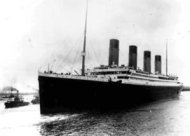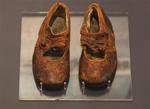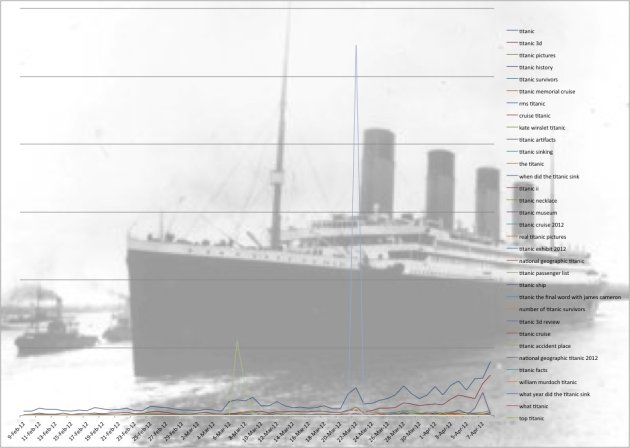Introduction
Despite their independence, their bravery and their freedom of movement, the Turkana are unable to control the single most vital element for ensuring their continuing prosperity: rain.Rainfall is erratic, although usually sufficient to provide enough fresh grazing for the animals. But every few years (on average every ten), a natural cycle which may be connected to the El Niño effect causes a devastating drought, and with it the decimation of herds and the deaths of many people. Contrary to what many people believe, these droughts are not a cruel anomaly of nature (or global warming), but a naturally recurring if unpredictable event which the Turkana must survive. Yet the unpredictable nature of these events, as well as the terrible toll they take, have inevitably led them to explain this - and rainfall in general - as the work of a force beyond their control. This force is God, whom the Turkana call Akuj.
Akuj - God
The vast majority of the Turkana still follow their traditional religion, which on the surface seems straightforward enough. There's one supreme God - Akuj - who is associated with the sky, and who can be addressed through prayer or through intermediaries such as diviners and living-dead ancestors. Like most people living in dry lands, the Turkana associate God with the provision or non-provision of rain. If God is happy, he will give rain. But if he is angry with the people, he will withhold it.His plans can be 'read' by "dreamers", and he can be called upon in times of need or during important ritual life-stages such as birth, the confirmation of marriage, and in death. At other times, little concern is given to his existence, as indeed the Turkana believe that God pays little heed to them, and this to such an extent that he sometimes needs to be reminded of their existence.
Akuj resides in the sky, or else is the sky itself. He also lives near the tops of mountains, particularly those responsible for rain. Akuj, however, is neither thunder nor lightning, for the Turkana know that there can be lightning without rain, but there cannot be rain without Akuj.
The word Akuj (Akuji, or Kuj) itself derives from the same root as the words for 'up' or 'above' (nakujmeans sky or heavens). As the provider of rain, Akuj is thus a benevolent force, although he is both the giver and taker of life. The Turkana have no God-centred creation myth as such, but Akuj's role as rain giver, and thus life-giver, is commonly misconstrued by some ethnologists to mean that he is also the Creator.
For the Turkana, the 'above' is a world divided between Akuj (God) or Akuj Nameri (God of the Stars) and Nipen or Ngiapan (spirits). Animal sacrifices are made both to Akuj and the spirits, so as to placate them at times of drought, famine, flooding, animal epidemics or any other disaster beyond human control.
Prophets and Diviners - the Dreamers
With such an unpredictable God as Akuj, it pays to be forewarned. This is the work of various diviners and prophets known collectively as emuron, who are able to interpret or predict Akuj's plans through their dreams, or through other means such as the reading of a sacrificed animal's intestines, tobacco, "string", gourds and stones, and most famously through the tossing of sandals, whose configuration when fallen back to earth can be interpreted (akiteyen; "caused to know") as a sign. Most are men (ngimurok), although there are some women, too (ngamurok). The emuron are God's chief representatives, purifiers of age-sets, predictors of the outcome of raids or war, and rainmakers. There role is not only one of prediction, but also to find the causes and cures of disease, and thus they also function as doctors. When people have troubles, they approach the appropriate emuron, who will divine the proper course of action to take. Often, a diviner will have a certain limited area of responsibilities defined by the extent of their powers. In a case where other skills are needed, they will work together towards the common end.In all cases, it is the emuron's role to relate what Akuj wants to communicate with the Turkana.
Initiation of a Dreamer
The most powerful form of emuron is the ekerujan or "dreamer", who has the closest union with Akuj, for it is in dreams that Akuj speaks most clearly to humans.
The role of emuron cannot be learned; neither is it hereditary, although a successful emuron is more likely to have children with the same powers as him- or herself. Instead, the state of prophethood is literally a calling, one chosen by Akuj. Before Akuj begins to communicate, he leads the unwitting candidate away from his home by the means of good spirits (ngipian lu ajokak). The prophet is taken to a place with much grass and animals, after which he is returned home. The person, probably rather shocked by what has happened, will relate the experience to other people, who then take him to an established emuron, who assures them that the man has been "taken away" by Akuj. The man is then purified (amook), and returns to normal life. It may be that that's the end of it all, and nothing further happens. But more usual is that the man begins to dream in a way different from before: he can "see" his dreams clearly, he begins to "speak out" (alimor) his "dreams" (ngakirujaeta), and they come true. This is because his having been "taken away" took him close to Akuj. He is now an emuron.
Rain and Sacrifice
Self-evidently, the dreamers can only be as accurate as Akuj or the extent of their powers allow them to be. In any event, they are powerless to prevent God from acting out his schemes or from forgetting to bring rain. Theirs is only a transmissive role.So, come a disaster such as the failure of the rains, it is commonly believed that God is angry with the people, or that he has simply forgotten them. Indeed, some sources state that Akuj prefers cattle to people, and that people are really no more than a side-show. Whatever, the people now need either to placate Akuj, or remind him of their existence, and this is achieved through the propitiatory sacrifice of animals to influence Akuj, presided over by a special emuron.
The sacrifice itself is relatively uncomplicated. The animal to be sacrificed is presented to Akuj with a simple and direct formula, something like "This is your animal, take it" or "This is your ox, take him." The sacrificers then continue with an equally blunt demand: "Give us life, health, animals, grass, rain and all good things". As Akuj owns all the world's cattle, the sacrifice could be seen as the spirit of the sacrificed animal being recombined with Akuj.
Animal sacrifices are also made at important social events such as birth, initiation, marriage and death, where God is made happy through a sacrifice, and presumably won't make anything bad in relation to the event sanctified. Sacrifices are sometimes also called for to cure a person of a disease. The sacrificial animal for this has to be the same gender as the person who wishes to be cured, although the emuron can decide otherwise if he dreamt about the case.
Anthony J. Barrett, in his introduction to Sacrifice and Prophecy in Turkana Cosmology, writes:
Sacrifice in Turkana can only be understood within the context of Turkana theology and, specifically, within the ambience of "prophecy" (adwaris) and its sub-elements, viz., utterance, word, vision, ecstasy, bitterness, dream, perspicacity, vocation (to call away), transportation (to be carried away by Akuj), prediction. All these elements are associated with sickness, "enemies" (ngimoe), war, raids, witchcraft, drought, rain and unusual occurrences.Prophecy, sacrifice, the sacred and Akuj are intricately connected. Without prophecy, there would be no reason for sacrifice; without the sacred, the sacrifice would have no sense; and without God, the sacrifice would be done for nought.
Sacrifices can be seen as attempts by humans to bridge broken relations with Akuj. Through sacrifice, Akuj is "made cool" (akitillimilim) and "happy" (akitalakar) through the sweet-smelling odour of the roasted meat and the live-giving principle (eta) which has been released. Incidentally, the principle of 'coolness' is not surprisingly a sacred one, with many connotations. This is especially evident in the respect which is accorded to trees by cause of the shade that they provide. Shade, as well as rain to which the Turkana word is related, is seen as a blessing. And in the shade of a tree, elders traditionally gather to make decisions, to offer sacrifices, or arrange raids. In this same shade, too, is where meat-feasts eaten, warriors decorated, men initiated, marriages arranged and finalised, judgement made, Akuj implored; spears, wrist-knives and fighting sticks are also made in a tree's shade.
From a musical point of view, the sacrifices are also some of the best times for traditional music. For despite the primary role of the emuron in ceremonies such as rain-making, songs addressed to Akuj can be sung both by individuals and groups to ask for rain. I found one sweet recording of a girl singing to Akuj for rain in Loiyangalani, but unfortunately that got left off the copy I made. Next time, I promise!
Death and the Ancestors
 The death of a family head is very important because it raises the problem of settling the inheritance. Death of a family head or older person is accompanied by intense mourning. The body is disposed of by burial and often a meat feast will follow.
The death of a family head is very important because it raises the problem of settling the inheritance. Death of a family head or older person is accompanied by intense mourning. The body is disposed of by burial and often a meat feast will follow.The cult of the dead is only given to the father and mother and important people such as emuron. These only have a right to be buried in the ground on which their hut is built. The hut will then be pulled down or abandoned. The eldest son inserts a piece of butter in the mouth of the dead person pronouncing this formula: "sleep in the cool earth and do not be angry with us, who remain on this earth." Other people traditionally were not given a burial, but were abandoned to hyenas and vultures. Nowadays, however, the Turkana are obliged to bury all their dead by law, although this is only verifiable in permanent settlements and in places where Christian missionaries have influence.
As is a common belief throughout Africa, the Turkana believe that upon death, the souls of the deceased go to the sky or else near to God. This does not, however, cut them off from their human relatives, who continue to hold that the living-dead are near to them and can be approached through prayer, libation and offerings. Thus the living-dead act as intermediaries between men and God, or between men and important, but more distant, forefathers. The "good" ancestors (ngikaram) can influence Akuj on their people's behalf through the medium of an emuron and the elders. However, the "good" ancestors can also be temperamental: diseases are often said to have been caused by them in anger at having been forgotten, much like Akuj 'forgets' the rain if the people have forgotten him.
In order to cure a disease, then, the patient can only be cured if the relationship with the ancestors is also cured, through prayers for unity that accompany an animal sacrifice, where pieces of meat are thrown towards the former dwelling places of ancestors, such as mountains, hills and rivers.
Christianity
 From the traditionalist's standpoint, the lack of success met by the Christian missions among the Turkana is a wholly refreshing change from the usual tale of conversion followed by swift entry into settled life, cash economy and abandonment of many pre-Christian beliefs, customs, rituals and musics.
From the traditionalist's standpoint, the lack of success met by the Christian missions among the Turkana is a wholly refreshing change from the usual tale of conversion followed by swift entry into settled life, cash economy and abandonment of many pre-Christian beliefs, customs, rituals and musics.Since 1961, when the Africa Inland Mission established a food-distribution centre and mission at Lokori to offset a famine that had started the year before, Christianity has been met with only limited success. Despite two hundred missionaries in the field today, the swift nomadic lifestyle of the Turkana precludes any long-term attempts at conversion, so that the only established churches are among the minority of settled Turkana in the small towns near the lake, and on the lakeshore itself where fishing is practised.
 These missions have managed to infiltrate traditional society through the provision of healthcare and schools as well as feeding centres in times of drought. Of Turkana District's six hospitals, four are run by churches; six of the seven health centres are Christian-run, as are 25 of its 27 dispensaries. Of course, this is by no means a negative thing. If criticism is to be levelled at anyone, it should be squarely aimed at the both the colonial and successive post-independence governments who have consistently shown a monumental indifference to the state of the Turkana.
These missions have managed to infiltrate traditional society through the provision of healthcare and schools as well as feeding centres in times of drought. Of Turkana District's six hospitals, four are run by churches; six of the seven health centres are Christian-run, as are 25 of its 27 dispensaries. Of course, this is by no means a negative thing. If criticism is to be levelled at anyone, it should be squarely aimed at the both the colonial and successive post-independence governments who have consistently shown a monumental indifference to the state of the Turkana.Nonetheless, evangelical websites talk wistfully of the Turkana:
"The Turkana are characteristically non-religious, therefore reaching them is difficult."The rather more Machiavellian truth is broached in passing on the Caleb Project's website: "The exposure to outside peoples, which has come with the efforts to assist the Turkana, has also exposed them to new lifestyle which is tearing apart traditional social networks. A people undergoing this kind of radical change are usually very open to new things such as Christianity, but unless they hear the Gospel quickly, new values will be patterned after other ideologies."
"The Turkana are receptive to change if they feel it is to their advantage. However, religion is not seen as a vital part of their life so they are indifferent to Christianity."
"The Turkana are nomadic people and any effort to assist these people will be difficult. The Turkana church must continue to deal with Turkana traditions. Some of these traditions are whole some and should not be incorporated into the Christian community. Others are contrary to Christian principles and must be transformed before they can be incorporated. Others must be rejected by the Christian community. A truly effective strategy that speaks to the Turkana has yet to be discovered."
Thankfully, the Turkana have proved formidably indifferent to the message preached by the Christians. Surely, Akuj cannot be indifferent?!




















 US (Courtesy of Road Runner) - A key federal report into what caused the worst offshore oil spill in U.S. history was being readied for release as early as Wednesday amid revelations that BP made critical mistakes on the well and failed to tell its partners and the U.S. government when it realized it.
US (Courtesy of Road Runner) - A key federal report into what caused the worst offshore oil spill in U.S. history was being readied for release as early as Wednesday amid revelations that BP made critical mistakes on the well and failed to tell its partners and the U.S. government when it realized it.
